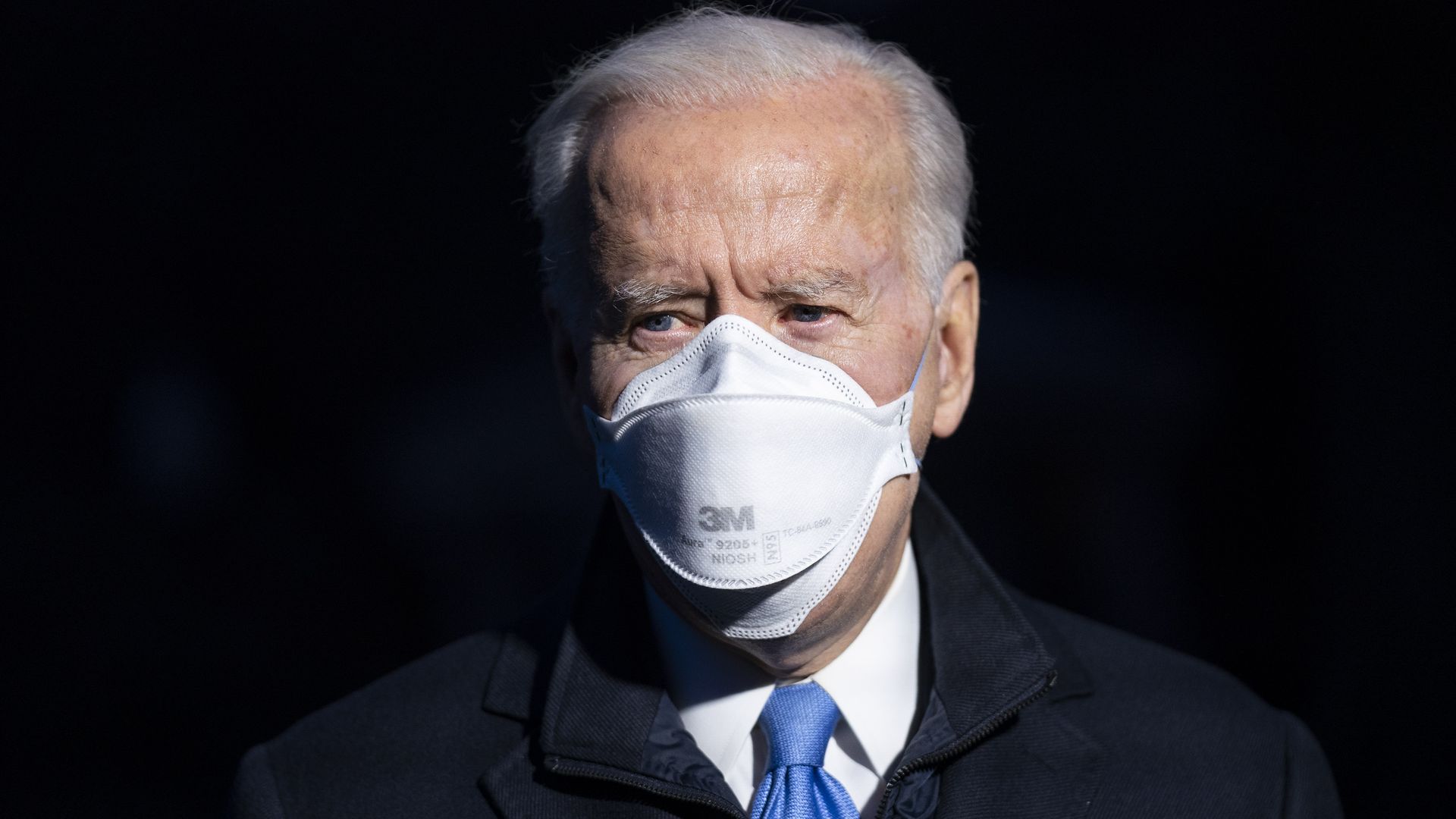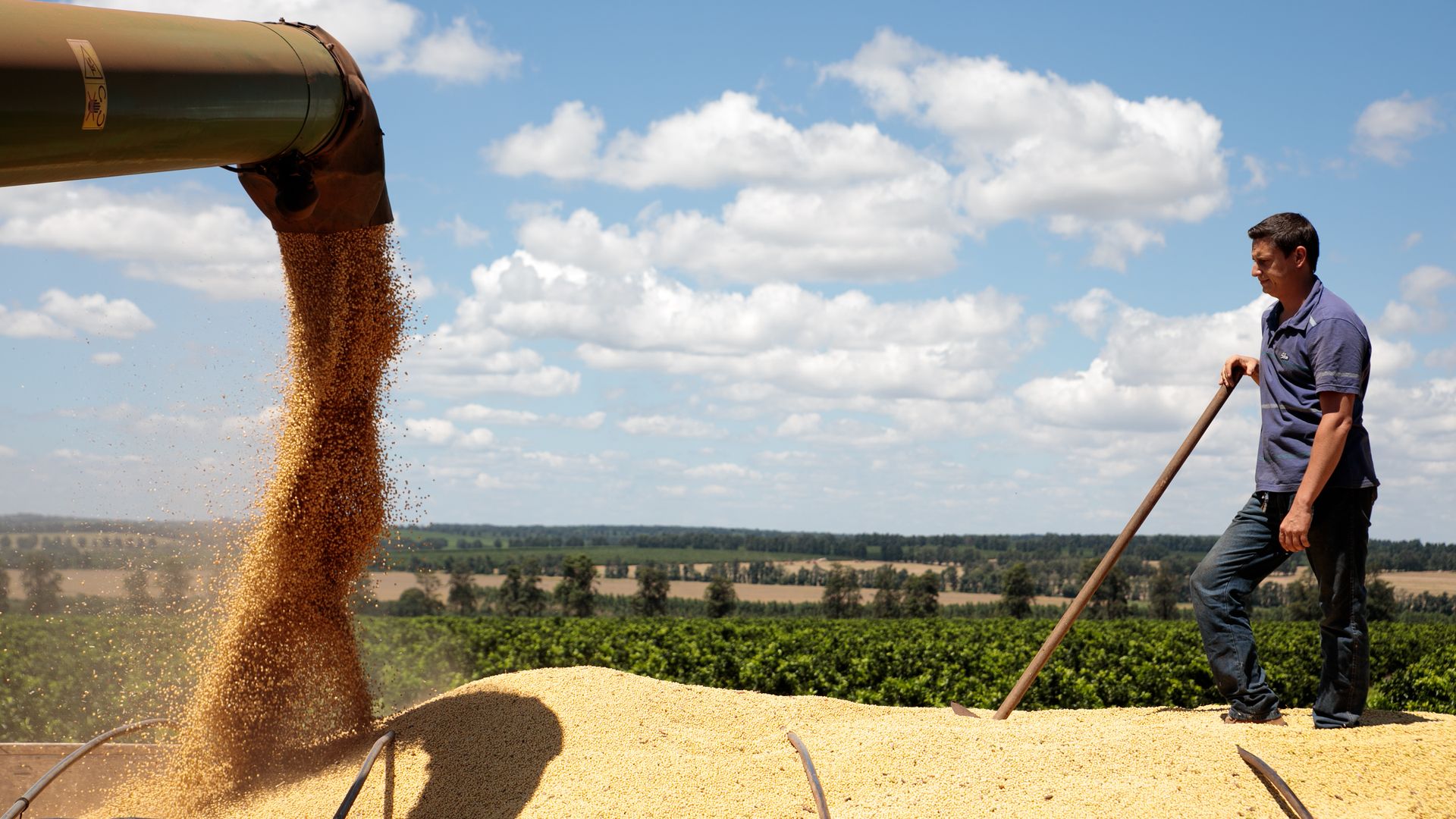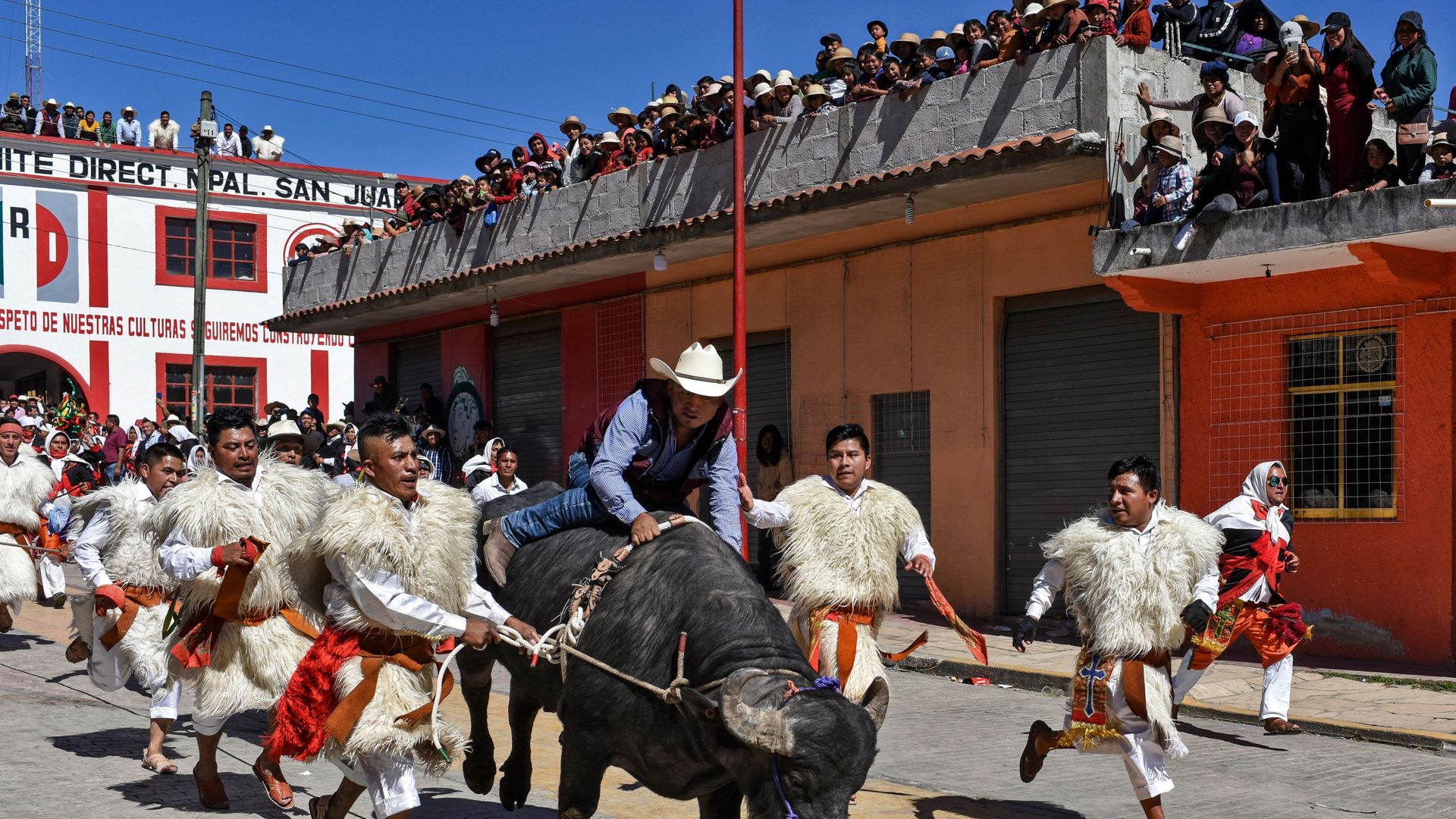| | | | | | | Presented By Babbel | | | | Axios World | | By Dave Lawler ·Feb 18, 2021 | | Welcome back to Axios World. - We're examining America's vaccine stockpile, listening in on Biden's calls, and negotiating a truly bizarre prisoner swap (1,721 words, 6 minutes).
- Heads-up: Learn more about how vaccines work, how they're tested, and the challenges in distributing them with our new "Get Smart" video series.
New arrival? Sign up | | | | | | 1 big thing: Donating dollars, but not doses |  | | | Biden. Photo: Kevin Dietsch/UPI/Bloomberg via Getty | | | | French President Emmanuel Macron says he and German Chancellor Angela Merkel agree that it's time for Europe and the U.S. to begin supplying developing countries with COVID-19 vaccines. The White House says it's too soon to have that conversation. Why it matters: The race to vaccinate the world against COVID-19 is top of the agenda for tomorrow's virtual G7 summit, and the U.S. is bringing along a commitment of $2 billion for the global COVAX initiative (using funds already allocated by Congress), plus an additional $2 billion over the next two years. - Senior administration officials told reporters this evening that they'll use those commitments to "call on G7 partners tomorrow both to make good on the pledges that are already out there" and to make further investments in global vaccine manufacturing and distribution.
The state of play: The discussion around COVID-19 aid is beginning to shift from dollars to doses. - The U.S. has purchased 1.2 billion doses — enough to fully vaccinate every American adult 2.5 times over, assuming additional vaccines like Johnson & Johnson's are approved.
- The situation is similar in other rich countries. Doses remain scarce for now, but supply will eventually far outstrip demand.
What they're saying: Macron told the FT today that the U.S. and EU should begin sharing before that happens, sending 3–5% of all available doses to poor countries in parallel with the domestic rollout. He said the proposal already had Merkel's support, and he hoped to convince Biden as well. - "We are allowing the idea to take hold that hundreds of millions of vaccines are being given in rich countries and that we are not starting in poor countries," Macron said.
- That "unprecedented acceleration of global inequality" was paving the way for "a war of influence over vaccines," Macron said, and playing into the hands of Russia and China, which are exporting state-funded vaccines around the world.
The other side: The White House said on today's briefing call that the administration planned to turn to donations only after all U.S. demand was met. - "When we have a sufficient supply, it is our intention to consider donating surplus vaccines," one senior official said.
- Asked about Macron's comments and the timeline on donations, another official said, "There are a lot of options on the table, but I don't think we should get locked down in what we might do once the U.S. population is vaccinated."
|     | | | | | | 2. America's vaccine arsenal: Two views |  Data: Duke Global Health Innovation Center; Chart: Michelle McGhee/Axios "From a U.S. perspective, we're losing a bit of the messaging war out there," says Krishna Udayakumar, director of Duke University's Global Health Innovation Center. - "If we look six months from now, it may well be the fact that the U.S. has donated more doses than any other country in the world. But right now, the storyline is how we're buying more and hoarding more of the supply."
Zeke Emanuel, vice provost for global initiatives at the University of Pennsylvania, acknowledges that the bulk purchases have sparked international criticism, but says things will look much different in the spring. By then, the U.S. will have ramped up domestic distribution and be able to think more about supplying doses globally. - Emanuel, who served on Biden's COVID-19 advisory board during the transition, says that as one of the world's biggest coronavirus hotspots — and its biggest economy — the U.S. should be a priority country for vaccination under all circumstances.
- He also says that the billions invested by the U.S. could help expand global vaccine production in the longer term.
- For now though, "every time a bilateral deal gets struck, it means capacity is taken out that could go towards supporting equitable access," a spokesperson from the Gavi vaccine alliance told Axios.
What to watch: As Anthony Fauci has noted, the emerging variants of COVID-19 underscore the necessity of efficiently distributing vaccines all over the world to truly get the pandemic under control. Go deeper |     | | | | | | 3. What to make of Biden's calls |  Israeli Prime Minister Benjamin Netanyahu had to wait a month for a call from President Biden, and while Saudi Crown Prince Mohammed bin Salman got a call today, it came not from Biden but from Defense Secretary Lloyd Austin. The big picture: Biden, Austin, Secretary of State Tony Blinken, Treasury Secretary Janet Yellen and national security adviser Jake Sullivan have together called officials from at least 43 countries, with Blinken alone calling 39 (there's considerable overlap between their call lists). - The administration's first calls generally went to America's neighbors, Canada and Mexico, followed by the U.K., France, Germany as well as leaders from the EU and NATO.
- Major U.S. partners in the Pacific (Australia, India, Japan and South Korea) have also taken priority, while Biden and Blinken have both spoken with their "great power" counterparts in China and Russia.
- Biden's 12th and most recent call went to Netanyahu, but he otherwise hasn't spoken with any U.S. partners in the Middle East. And while Blinken has spoken with officials in Saudi Arabia and the UAE, there has yet to be a single call announced with Egypt.
Between the lines: While Netanyahu had to wait a few weeks for a call, Blinken, Austin and Sullivan all held early calls with their Israeli counterparts. If any longtime U.S. partner should be wary of a "snub," it's probably the Egyptians. - The Biden administration has already raised concerns about human rights abuses by the Egyptian government, in a clear break from Trump's "my favorite dictator" approach to Abdel Fattah al-Sisi. However, the State Department still approved a big arms deal with Egypt this week.
Why it matters: The calls give some sense of Biden's early priorities. - Excluding Israel, there have been fewer calls to the Middle East (seven total to Iraq, Jordan, Saudi Arabia, Turkey and the UAE) than to Southeast Asia (eight calls to Indonesia, Philippines, Singapore, Thailand and Vietnam).
- The administration's focus on the Indo-Pacific was further underlined by Blinken's participation today in discussions with his counterparts from the "Quad" strategic dialogue: Australia, India and Japan.
- Blinken also met virtually today with officials from France, Germany and the U.K. to discuss issues including Iran, the administration's one genuine priority in the Middle East.
Worth noting: There have been relatively few calls thus far to Latin America or Africa. Leaders in both regions are hoping for more attention from Biden than they received from Trump. What to watch: Biden will address the Munich Security Conference on Friday and also take part in the virtual G7 summit, two of his first "international" engagements as president. |     | | | | | | A message from Babbel | | How to learn a new language in three weeks | | |  | | | | 73% of Babbel users said they could have a simple conversation in their new language after just 5 hours of lessons. The reason: The language app makes it easy with bite-sized lessons, so you can spend less than 15 minutes a day learning language skills you'll remember. Sign up today and get 50% off. | | | | | | 4. State of the outbreak: Getting experimental |  1. The U.K. plans to start the world's first COVID-19 challenge in the next few weeks, with 90 volunteers aged 18–30 being exposed to the virus. - The trial will give scientists a sense of things like the amount of exposure required for an infection and how the immune system responds, per the BBC.
2. A much different experiment got underway this week in the Brazilian commuter town of Serrana — the entire town is being vaccinated. - The experiment should shed light on the speed at which vaccines can slow the spread, and it could help convince Brazilians of the value of vaccines, per the WSJ.
3. However, the vaccine they're using in Serrana, from China's Sinovac, reported somewhat disappointing trial results to authorities in Hong Kong, showing 62.3% efficacy. - Authorities there approved the vaccine today, but a recent poll found that fewer than 3 in 10 Hongkongers intend to take it, per the NYT.
4. Indonesians who refuse to be vaccinated could face fines or other penalties. - A poll found two-thirds of Indonesians want to be vaccinated, but the government is trying to boost the efficiency of its rollout by making vaccination compulsory, per Bloomberg.
5. Taiwan has accused China of interfering in its efforts to buy the Pfizer/BioNTech vaccine, per the FT. |     | | | | | | 5. The craziest story you'll read today |  | | | Netanyahu (L) and Putin in Moscow in January 2020. Photo: Mikhail Svetlov/Getty Images | | | | Russia has brokered an unusual prisoner swap that saw Syria release an Israeli woman who crossed into the country on Thursday, Israeli officials tell Axios' Barak Ravid. The backstory: For reasons unknown, an Israeli woman in her 20s crossed into Syria two weeks ago via the Golan Heights, entered a village and began speaking with local people. - Someone apparently alerted the Syrian military that an Israeli had wandered into the village, because she was arrested and taken for questioning by Syrian intelligence officers.
- The Syrians initially suspected that she was a spy, as did Israeli officials who heard an Israeli woman had been captured. But it soon became clear that she was a civilian.
- The Syrians notified Russian forces in Syria, who informed the Israelis of the full situation. The ensuing negotiations included a call between Netanyahu and Vladimir Putin.
The Syrians quickly agreed to the idea of a prisoner exchange, and a deal was eventually reached: Israel would release two Syrians convicted of terrorism-related offenses and provide Syria with COVID-19 aid. But then there was a snag. One of the prisoners said he would rather remain in an Israeli prison for the 14 years left in his term than be deported to Syria, the Israeli officials say. - However, Israeli soldiers had already been sent to the buffer zone between Israel and Syria in search of bargaining chips. They had waited for two shepherds to cross into an Israeli enclave and captured them.
- Syria ultimately agreed to swap the Israeli woman for the shepherds.
Go deeper |     | | | | | | 6. What I'm reading: Brazil's hidden boom |  | | | The soy harvest in Mato Grosso. Photo: Patricia Monteiro/Bloomberg via Getty | | | | Times are hard in Brazil. The pandemic has been devastating, the economy is still sputtering through a lost decade, and crime is endemic in the big coastal cities. The flipside: In the interior, agricultural states like Mato Grosso are riding soybean exports to unprecedented prosperity, the FT's Bryan Harris reports in a fascinating dispatch. - "It is a boom that has been spurred by shifting geopolitics, from the rise of China, with its insatiable demand for food stuffs, to the arrival of populist leaders such as Brazilian president Jair Bolsonaro, an idol to many in Mato Grosso."
- "Mato Grosso — in Portuguese it means 'thick forest' — is now dominated by vast, flat agricultural plantations reminiscent of the American Midwest. In its northern reaches, where this landscape meets the Amazon rainforest, the state has become a flashpoint for illegal deforestation."
- The boom has given birth to "a Brazil that even Brazilians don't know about" — characterized by newfound wealth, environmental degradation, optimism, and evangelical Christianity.
What to watch: To keep it going, the farmers are relying on infrastructure improvements, lax environmental enforcement and friendly relations with China. |     | | | | | | 7. Stories we're watching |  | | | Celebrating Carnival in San Juan Chamula, Chiapas state, Mexico. Photo: Isaac Guzman/AFP via Getty | | | - How countries amplify COVID disinformation
- Australia news law: Facebook walks, Google caves
- North Korean hackers charged
- Qatar wants to mediate between U.S. and Iran
- Americans are consuming more foreign content than ever
- Estonia warns of "silenced world dominated by Beijing"
- Biden's point man on Israel-Palestine isn't aiming for a Nobel Prize
Quoted: "You must be flexible and able to cope with frequent travel both within and outside of Europe, and even off Earth." — From a new job posting for astronauts from the European Space Agency |     | | | | | | A message from Babbel | | The app that'll teach you a new language in less than a month | | |  | | | | Babbel helps you become conversational in a new language with just three weeks of practice. The number one selling language app teaches you the skills you need for real-life scenarios, excluding any random words or unhelpful phrases. Get 50% off one of 14 languages. | | | | | | Axios thanks our partners for supporting our newsletters.
Sponsorship has no influence on editorial content. Axios, 3100 Clarendon Blvd, Suite 1300, Arlington VA 22201 | | | You received this email because you signed up for newsletters from Axios.
Change your preferences or unsubscribe here. | | | Was this email forwarded to you?
Sign up now to get Axios in your inbox. | | | | Follow Axios on social media:    | | | | | |











No comments:
Post a Comment